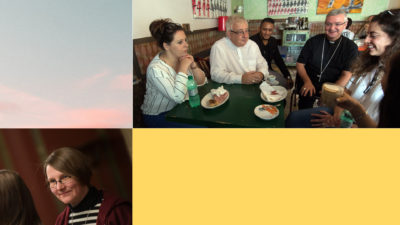Read this article in the limited edition print version: order a copy here.
Historically, synods were gatherings of important clerical decision-makers. The Synod of Whitby decided on the dates of Easter; in the 60s, Bishops gathered in Rome to unpack the Second Vatican Council. In recent years Pope Francis has given new prominence and life to the concept of Synodality in the Roman church, emphasising the idea of walking together in conversation, with no one left behind.
Synodality takes time. I was fortunate to be involved in the preparation for the Liverpool synod that has recently finished; it was intended to last three years but, because of Covid-19, ended up lasting four. The key issues were: how to listen; who to listen to; what questions to ask; how to record and synthesise what was said; how to devise and communicate a plan in response; how to put a plan into action.
Many participants said that the opportunity to be listened to without interruption was a new and life-enhancing experience.
The initial preparation was all about how to listen. We opted for a method that allowed everyone present at a meeting to speak without interruption. People were divided into small groups and everyone in the group was given the chance to speak before anyone was allowed to respond. This formulaic method worked well. Many participants said that the opportunity to be listened to without interruption was a new and life-enhancing experience.
The next key question was to give as many people as possible an opportunity to speak, so that voices not usually heard were made welcome. It wouldn’t be enough to only consult weekly Mass-goers. The surprising result of casting the net wide was gathering over 200,000 responses.

The combination of parish reps, deanery delegates, weekends away, diocesan resources (including paid staff) and generous amounts of time led to a productive four years of talking, listening, discerning and the preparation of a pastoral plan. It’s hard to imagine it being condensed into a much shorter period.
We are some way into the two-year global synod that the Pope has initiated; I wonder how many people have heard what’s under discussion, or been actively encouraged to give an opinion about any of them?
There have been letters to the Tablet describing good practice, but how widespread is it? Who has asked you anything? Who’s stood up in your church and started a conversation about repurposing empty church buildings, or led a prayer meeting about the diocesan investment policy, or organised fasting for guidance on same sex marriages, and so on? Has there at least been time set aside during the weekly Mass, even if no one has come knocking on your door to ask your opinion?
We must become a church that walks together; that consults; that is full of conversation; that listens.
Of course the other side of the coin is to ask: what initiative have you shown? How many conversations have you had? What are the ten headings that have come from the Vatican? Who will you send your thoughts to so that they are not lost?
If church is to survive, it will not be enough to have synodality as just the latest buzz word to reassures us that all is well. We can’t survive if we don’t worry about irrelevance or empty churches. We must become a church that walks together; that consults; that is full of conversation; that listens; that discerns; that acts in the world.
The sooner we get started the better because synodality is a process rather than an event. It wouldn’t be properly synodal to ask the questions once only, before slipping back to business as usual. The process commits to repeated conversations, repeated discussions, repeated discernments, repeated demonstrations that we are all in it together.
In some ways, this is Catholic Social Teaching in action. It’s everyone being treated with dignity, looking for the common good, ensuring that subsidiarity is actively linking the bottom with the top, that the needs and concern of the least are central to the decisions and action of the powerful.
Related Stories

Experiences of Passionist prayer, pt. 3: Joanne Crompton
How do we pray? What role does prayer take in our lives? We asked three people pursuing a Passionist spirituality how their sense of prayer has changed over time.
Jul 05 2023

Experiences of Passionist prayer, pt. 2: Bishop William Kenney
How do we pray? What role does prayer take in our lives? We asked three people pursuing a Passionist spirituality how their sense of prayer has changed over time.
Jun 24 2023

Experiences of Passionist prayer, pt. 1: Michael O’Halloran
How do we pray? What role does prayer take in our lives? We asked three people pursuing a Passionist spirituality how their sense of prayer has changed over time.
Jun 18 2023




